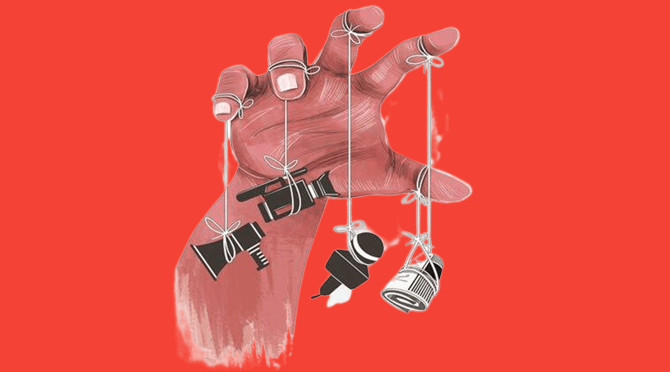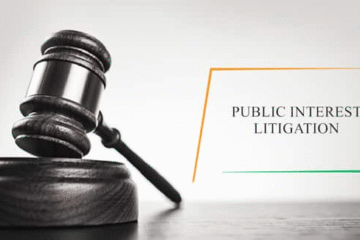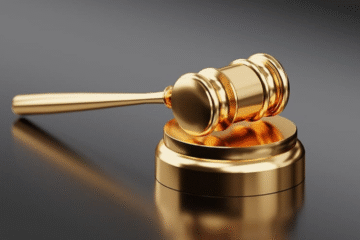Freedom of Press
This Article is written by Shreya Singhal, a first year BA.LL.B. (Hons) student at the Rajiv Gandhi National University of Law, Punjab, Intern under legal Vidhya

Abstract
“I Disapprove of What You Say, But I Will Defend to the Death Your Right to Say It”.
This powerful thought was put forward by Voltaire many years ago. This quote portrays how freedom to speech and expression is essential for an individual. Moreover, what should be ascertained is that this freedom is not just exercised literally but also followed through its spirit. Freedom of an individual to speak up for his own rights and whatever he considers to be just and unjust in the society is quintessential. Press and News Media is the one institution for which this right is of utmost importance.
Press is one of the most common and omni-present institutions of any democratic country. It has played an undeniable role in the evolution and formation of the democratic setup of the countries. It is often considered to be the fourth pillar of a democracy after legislative, executive and judiciary. From times immemorial, it has been noticed that press was often used as a means to shape the public opinion and public views at large. It cannot be denied that without a free press, the country would be ill- informed as a vicious media and press would involve rigging of the information by the leader of democratic set- ups and autocrats of non- democratic set- ups. During French Revolution and during the Indian struggle for independence, often the freedom of press was subordinated in order to keep the public unaware of the activities happening around the world so that they do not get affected and inspired to start a revolution.
Freedom of Press is one of the most common buzz- words that we hear today. Today, in the 21st century, owing to the amount of awareness that the world has achieved, press should be the most powerful institutions. However, if the trend is noticed the same does not hold true. Press today is being dominated by either influential political parties or on the other hand by power, fear and money. In such a scenario, maintaining the reliability and verifiability of the news circulated to the common public stands threatened.
Key Words
Press, Freedom of Press, Malpractices, Democracy
Introduction
Article 19 of the Indian Constitution guarantees the right to freedom of speech and expression, including the freedom of the press. The article states that all citizens shall have the right to freedom of speech and expression, and this right shall include the freedom of the press. This provision recognizes the importance of the press in a democracy, as it allows citizens to access information, voice their opinions, and hold those in power accountable. The press serves as a watchdog of the government, ensuring transparency and accountability in the functioning of the state. Freedom of the press is enshrined in the Indian Constitution as a fundamental right under Article 19(1)(a), which guarantees freedom of speech and expression to all citizens. This includes the freedom to express one’s opinions, to criticize the government and its policies, and to disseminate information and ideas through the media.
However, freedom of the press is not absolute, and reasonable restrictions can be imposed on it in the interests of India’s sovereignty and integrity, state security, public order, decency, or morality, or in relation to contempt of court, defamation, or incitement to an offence. These restrictions have sparked much discussion and contention, with critics claiming that they can be used to stifle dissent and silence critical views. The government must strike a balance between the right to free expression and other important considerations, such as national security, without resorting to arbitrary limitations that could jeopardize this basic right.
Overall, Article 19 of the Indian Constitution recognises the value of a free press in a democratic society and ensures this freedom to all citizens. However, greater vigilance is required to ensure that this freedom is not unduly restricted and that the press can operate freely and independently without fear of retaliation.
Status of Press in India today
Press freedom is an important component of democracy, and India, the world’s largest democracy, recognizes this right. The Indian Constitution guarantees freedom of opinion, including freedom of the press. However, freedom of the press in India, like any other right, is not absolute and is subject to reasonable limitations. India’s media landscape is vibrant and varied, with numerous newspapers, television channels, and internet news websites. In India, the press has considerable freedom and has played an important role in exposing corruption, bringing social problems to light, and holding the government accountable.
However, there have been concerns about press independence in India over the years. The government has been accused of using different methods, including the press, to silence dissenting voices. Journalists have been assaulted, harassed, and even murdered for covering sensitive topics such as corruption, communal violence, and human rights violations.
There has been increased government interference in the working of the media in recent years, including the suspension or cancellation of broadcasting licenses, arbitrary arrests of journalists, and the use of sedition laws to silence critical voices. Furthermore, media ownership in India is concentrated in the hands of a few big conglomerates, raising concerns about the press’s freedom and impartiality.
Sedition Law Cases in India
In recent years, there have been several cases where journalists in India have been charged with sedition under Section 124A of the Indian Penal Code (IPC). Sedition is defined as any act that brings or attempts to bring hatred or contempt towards the government of India, and is punishable by imprisonment for life or up to three years, or with a fine, or both. Some notable cases of journalists being charged with sedition include:
- Kanhaiya Kumar: The former president of the Jawaharlal Nehru University Students’ Union was arrested in 2016 on charges of sedition for allegedly participating in an event where anti-national slogans were raised. Kumar, along with other students, was accused of shouting slogans against the Indian state and in favor of Kashmir’s independence. The charges against Kumar were eventually dropped.
- Arnab Goswami: The Republic TV anchor was charged with sedition in 2019 for allegedly inciting communal hatred and making derogatory comments against the police and the Maharashtra government. Goswami was arrested and released on bail a few days later.
- Vinod Dua: The veteran journalist was charged with sedition in 2020 for allegedly spreading fake news and making derogatory comments against the Prime Minister and the Home Minister. Dua was eventually granted anticipatory bail by the Supreme Court.
These instances have prompted debates in India about the application of sedition laws and their potential abuse to stifle dissent and silence critical voices. Critics claim that the government is using these rules to intimidate journalists and stifle free expression. As a result of these concerns, there has been a demand for the government to review and reform the sedition laws to ensure that they are not used to restrict free speech and expression. However, the sedition law is still in effect, and journalists are still at risk of being charged with sedition for their reporting and views.
Freedom of Press Violations in the World
The violations of freedom of press are not unique to our country. Unfortunately, violations of freedom of the press occur in many countries around the world. Some of the most egregious violations in recent years have occurred in the following countries:
- China: The Chinese government has a long history of suppressing free speech and the press. In recent years, the government has cracked down on independent media outlets and journalists, including those reporting on sensitive topics like human rights abuses, corruption, and the COVID-19 pandemic.
- Russia: The Russian government has a tight grip on the media and has taken steps to limit free speech and independent reporting. Journalists critical of the government have been harassed, arrested, and even killed.
- Turkey: In Turkey, the government has arrested and imprisoned journalists, shut down independent media outlets, and taken steps to control social media platforms. This has had a chilling effect on freedom of expression in the country.
- Saudi Arabia: The Saudi Arabian government has a poor track record on human rights and freedom of the press. Journalists have been arrested and even killed for reporting on sensitive issues like the war in Yemen and the murder of journalist Jamal Khashoggi.
- Myanmar: In Myanmar, the military junta has cracked down on independent media outlets and journalists in the wake of the 2021 coup. Journalists have been arrested, beaten, and even killed for reporting on the government’s actions.
These are just a few examples of countries where freedom of the press is under threat. There are many other countries where journalists and media outlets face similar challenges. Such violations of the press of freedom undermine the truthfulness of the media. The media is made to write, publish and broadcast the news in a certain pre-defined manner which often compromise with the actual news.
Solutions
The problem of an unfree press is a complex one, and there are no easy solutions. However, some of the measures that can be taken to promote a free press include:
- Legal Reforms: There is a need to review and reform laws that curtail freedom of speech and expression, including sedition and defamation laws. The laws should be balanced, and reasonable restrictions should be placed to ensure that they are not misused to stifle dissent.
- Protecting Journalists: Journalists should be protected from harassment, intimidation, and violence. The government should take strict action against those who attack journalists and ensure that they are held accountable for their actions.
- Media Pluralism: There is a need to promote media pluralism by ensuring that the ownership of media outlets is not concentrated in the hands of a few large conglomerates. This can be achieved by providing incentives for small and independent media and promoting community media.
- Media Literacy: Promoting media literacy and critical thinking skills among citizens can help them to distinguish between accurate and false information. This can reduce the spread of fake news and propaganda and promote a culture of media literacy.
- Self-Regulation: Media organizations should adopt self-regulatory mechanisms to ensure that they maintain high ethical standards and act in the public interest. This can include developing codes of conduct and establishing independent bodies to oversee the media’s functioning.
Overall, promoting a free press requires a concerted effort by the government, media organizations, civil society, and citizens. By taking steps to protect and promote the media’s independence, we can ensure that the press remains a critical pillar of democracy and serves the public interest.
Conclusion
Freedom of the press is a fundamental human right that is required for a free and democratic society to operate. When the press is free to report without fear of being persecuted or censored, it can hold those in power accountable, provide citizens with information, and promote public debate and discussion. Unfortunately, violations of press freedom occur in many nations around the globe, most frequently in the form of harassment, imprisonment, and violence directed at journalists and media outlets. Individuals, civil society groups, and governments must all work together to protect and promote press freedom and ensure that journalists can report on issues that are important to their communities.
In conclusion, while India has a strong heritage of free press, there are concerns about increasing press restrictions in recent years. The government must ensure that the press can operate freely and without fear of retaliation or harassment, and that media ownership does not become concentrated in the hands of a few strong entities. If this is not guaranteed, any nation’s freedom and integrity will be jeopardized, and the spirit of a democratic republic will be lost.




0 Comments